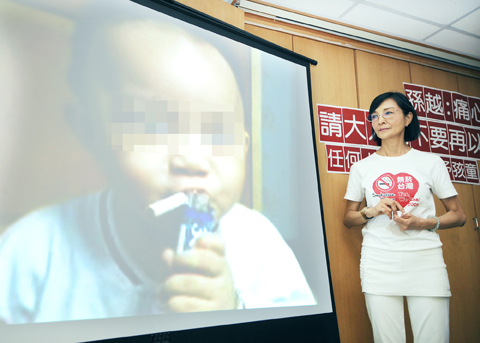Parents who give cigarettes to their children are not only breaking the law, but are also torturing their children and should be heavily penalized, the John Tung Foundation said yesterday.
The foundation also publicized videos in which parents or other adults were seen providing cigarettes to children and babies and laughing as they smoked or coughed after inhaling the smoke.
Photos and videos of young children smoking cigarettes have been posted on the Internet recently.

PHOTO: LIAO CHEN-HUEI, TAIPEI TIMES
Lin Ching-li (林清麗), head of the foundation’s Tobacco Hazard Prevention Section, said that in the past four days, the foundation had received more than 20 complaints concerning videos posted by adults who let children smoke cigarettes.
Many of the videos are posted on Internet video sites and popular blog sites and can be found under categories such as “family entertainment” or “learning and growing,” she said.
The foundation said such parenting behavior was irresponsible and was no different from people who record themselves torturing animals and post the video on Web sites.
Parents who allow or even force their children to smoke cigarettes are damaging their children’s health and skewing their children’s behavior, it said.
The foundation said studies showed that the younger a person starts smoking, the more difficult it will be for that person to quit the habit.
People who start smoking before they are 15 years of age are also eight times more likely to develop lung cancer, the foundation said.
“Parents should realize that they are responsible for their children’s welfare,” Sun Yue (孫越), a celebrity who is now a volunteer at the foundation, said. “Parents should not find entertainment or happiness at the expense of their children’s health.”
The foundation said adults who provide tobacco to children were in violation of the Children and Youth Welfare Act (兒童及少年福利法), an offense punishable by a fine of between NT$10,000 and NT$50,000.

A preclearance service to facilitate entry for people traveling to select airports in Japan would be available from Thursday next week to Feb. 25 at Taiwan Taoyuan International Airport, Taoyuan International Airport Corp (TIAC) said on Tuesday. The service was first made available to Taiwanese travelers throughout the winter vacation of 2024 and during the Lunar New Year holiday. In addition to flights to the Japanese cities of Hakodate, Asahikawa, Akita, Sendai, Niigata, Okayama, Takamatsu, Kumamoto and Kagoshima, the service would be available to travelers to Kobe and Oita. The service can be accessed by passengers of 15 flight routes operated by

Chinese spouse and influencer Guan Guan’s (關關) residency permit has been revoked for repeatedly posting pro-China videos that threaten national security, the National Immigration Agency confirmed today. Guan Guan has said many controversial statements in her videos posted to Douyin (抖音), including “the red flag will soon be painted all over Taiwan” and “Taiwan is an inseparable part of China,” and expressing hope for expedited reunification. The agency last year received multiple reports alleging that Guan Guan had advocated for armed reunification. After verifying the reports, the agency last month issued a notice requiring her to appear and explain her actions. Guan

GIVE AND TAKE: Blood demand continues to rise each year, while fewer young donors are available due to the nation’s falling birthrate, a doctor said Blood donors can redeem points earned from donations to obtain limited edition Formosan black bear travel mugs, the Kaohsiung Blood Center said yesterday, as it announced a goal of stocking 20,000 units of blood prior to the Lunar New Year. The last month of the lunar year is National Blood Donation Month, when local centers seek to stockpile blood for use during the Lunar New Year holiday. The blood demand in southern Taiwan — including Tainan and Kaohsiung, as well as Chiayi, Pingtung, Penghu and Taitung counties — is about 2,000 units per day, the center said. The donation campaign aims to boost

The Central Weather Administration (CWA) said a magnitude 4.9 earthquake that struck off the coast of eastern Taiwan yesterday was an independent event and part of a stress-adjustment process. The earthquake occurred at 4:47pm, with its epicenter at sea about 45.4km south of Yilan County Hall at a depth of 5.9km, the CWA said. The quake's intensity, which gauges the actual effects of a temblor, was highest in several townships in Yilan and neighboring Hualien County, where it measured 4 on Taiwan's seven-tier intensity scale, the CWA said. Lin Po-yu (林柏佑), a division chief at the CWA's Seismological Center, told a news conference